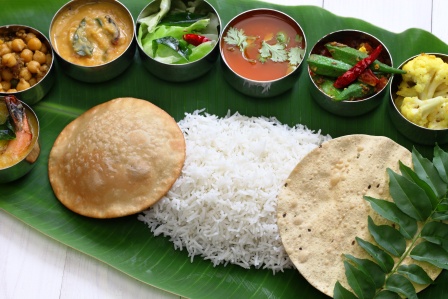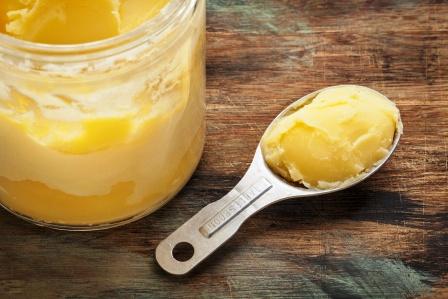When To Consume Ghee? Before Or After Food?
If you have ever eaten a customary Brahmin meal, ghee is usually served in the beginning. It gives a good indication about timing of ghee consumption. But there are few other factors to consider to decide on timing of ghee consumption.
The below points hold good both for medicated ghee (Ayurvedic ghritams) and common cow ghee (clarified butter).
Heavy foods are usually consumed early in the meals:
Sweets are to be consumed first, and then sour foods, etc. Of all the foods, sweets are usually heavy. Heavy-to-digest foods are consumed first, because, when the person is totally hungry, his Agni (digestion strength) is at maximum level. So, digestion of heavy foods will be easy.
Ghee also has heavy quality. (Guru Guna). Hence, it makes sense to consume ghee in the early part of the meals, so that it gets digested properly with the help of Agni.

Read related: 60 health benefits of ghee as per Ayurveda
Table of Contents
Ghee as per Dosha
During the process of digestion, the last part is dominated by Vata Dosha. So, just before you have your meals, there is Vata dosha increase. Ghee balances Vata and Pitta Dosha. Hence, it makes sense to take ghee before or during early part of meals.

Ghee increases Agni
Apart from being heavy, ghee also increases Agni – digestion strength. Hence, ghee is used in Homa, Yajna etc spiritual practices where ghee is put to fire to increase fire.
Keep in mind that, this agni improving quality of ghee is not as powerful as, ginger, for example.
So, if ghee is consumed in the beginning of meals, it also boosts Agni and aids in digestion of rest of the consumed food items.
Ghee protects stomach
Ghee protects gastric mucosa (inner lining of stomach). Hence, if you are consuming ghee in the beginning of meal, then it would nullify the spicy food that you may eat later in the meals.
With spicy meal:
So, if your meals is spicy all together, then you can consume ghee at the end part of the meals or soon after meals. Spicy food will keep the digestion strength high enough to digest ghee even after food.
With coolant meal:
If the meal ends in curd rice or any coolant foods such as ice cream, then it is not a good idea to have ghee at the end. Ghee needs something hot, to undergo proper digestion.
With hot meal:
If the meal completely comprises of freshly prepared food in hot condition – Hot chapati with cooked Sabji, etc, then it is fine to have ghee at the end of meals.
Signs of good digestion of ghee
Good physical strength, lightness of the body, good strength of sense organs, lack of sleepiness or lethargy.
Signs of ghee indigestion – heaviness, bloating, fatigue, belching, dryness of mouth, excess thirst, uneasiness in stomach.
If you are feeling ghee indigestion, then take fatless buttermilk – one cup. Add a pinch (1 gram) of ginger powder or pepper powder to it. Mix well and drink it. Fatless buttermilk is said as medicine for ghee indigestion.
This is the reason why, in a typical Brahmin meal, ghee is served first and then at last fat-less buttermilk in Hindu meals. Buttermilk would negate any side effects of excess of ghee.
What if your doctor has prescribed medicated ghee (Ayurvedic Ghritam) to be taken after meal?
Usually medicated ghee (Ghritam) is processed with spices which makes it more digestible.
If your doctor has prescribed after food, then he must have taken your digestion strength to consideration and should have made the right decision.
Hence please follow his advice.
Usually, Ayurvedic medicines are administered after food,
a. in disorders of Vyana Vata (which is situated in chest / heart, circulates all over the body and is cause for flexion and extension of hands, legs etc.)
b. In disorders of Udana Vata (which controls speech, enthusiasm, memory etc).
So, in these two circumstances, medicinal ghee is administered after food.
Read related: How time of medicine consumption is decided as per Ayurveda?
Have half a cup of hot water after taking ghee. As hot water aids in better digestion of ghee.









30 comments
Vijayakumar PANDI
I am not sure of the very first statement – “Sweets are to be consumed first, and then sour foods, etc. ”
In many cultures and gastronomic principles, Sweets are consumed as the last portion of the food, which is coined as “Dessert”, sometimes Ice creams and Betel leaves too are considered for desserts.
Desserts like sweets and ice cream, when consumed at the end of the spicy or sour meal, would cool down the body temperature and helps in digestion.
Any different opinion on this ..?
Dr J V Hebbar MD(Ayu)Author
Hi, any coolant substance would not help in digestion process. Digestion process is compared to Agni – fire. So, only hot substance would aid in digestion.
If the meals involved spicy foods, only then, having some amount of desserts at the end of the meals makes sense.
Mukesh k. Shah
I have read instructions on ghee … I got good amount of knowledge on cow ghee .. Thanks a lot.
But my question about what is the maximum quantity of cow ghee I can take in a day … Is not answered any where. Any ways thanks a lot.
Dr Malini Bhat
Hello sir, Healthy people should have 3 teaspoons (15g / 1 tablespoon) of desi ghee per day to get all benefits. Preferably one teaspoon of pure ghee, three times a day will do the job. Ghee consists entirely of fat. Even though it might be a ‘healthy’ saturated fat, it’s not healthy to eat in large amounts.
Paula Shayani
Hello, sir. Here in northern part of Brazil ghee has been cooked with salt butter. What is your opinion about it? Kind regards.
Dr J V Hebbar MD(Ayu)Author
Salt increases Pitta and ghee is used to calm Pitta, hence, as per Ayurveda principles, it is not a good habit.
Paula Shayani
Thank you very much for your reply. The people who cook with ghee say that when it is cooked the salt remain with other impurities and the ready ghee is no salt. Is that true? Is it acceptable by an Ayurvedic view? Thank you again.
chaitra jagirdar
Wonderful article sir…you are soo right…I was wondering if there was a limitation on amount of ghee consumption.Am vata- pitta type…and I like the taste of ghee & eat it liberally.So, is there a side effect of eating too much ghee sir?
Dr J V Hebbar MD(Ayu)Author
Thanks! For Vata Pitta people, (thin), ghee can be taken in slightly higher dose of 2 – 3 teaspoons per day. For others – 1 – 2 teaspoons per day.
Aarav Sharma
Ghee just like any other substance must be consumed in moderation so as not to cause any harm to the body. Excess of anything can never be a good thing. As Dr. JV Hebbar has rightly mentioned, 1-2 teaspoons of ghee is the right amount for the average person. I personally like to have my teaspoon of Gowardhan ghee with my meal every day. I simply can’t do without its rich and creamy flavour and love the fact that it’s made from pure cow’s milk.
doyal
is it ok to take 1tsp cow ghee with hot rice daily for diabetis with choleterol medications or should stop completely?
Dr J V Hebbar MD(Ayu)Author
It cannot be used as a medicine for diabetes / cholesterol
Jaideep Rana
Sir, I am not able to understand completely when we say that ghee increases agni without increasing pitta?
Does it mean that ghee increase HCL production ? Is agni(jatharagni) equal to HCL in modern science or is it more than that i.e HCL + all the enzymes?
I am also curious to know whats the difference between pachakagni(jatharagni) and pachakpitta? I know that pachak pitta acts as a fuel for pachakagni, but want to know more of it in detail.
Also I would really appreciate if you could suggest on how ghee should be consumed in the case of mandagni and high pitta or whether it is counter-indicated and shouldn’t be consumed in such case?
BK
Hi Doctor
Thank you for an informative article about ghee.
I am still a little confused about cooking with ghee.
If we don’t administer ghee everyday, is it ok to cook with ghee 2 to 3 times a week?
eg use it to cook biriyani, curry, omelettes, pancakes etc – ie just use ghee instead of oil for cooking.
Thank you!
aps
what quantity (in ml) cow ghee can be consumed by a person per day ?
prachi k
Which ghee is most effective…cow or buffalo
Dr J V Hebbar MD(Ayu)Author
Cow
Alex
Hello Sir
Should ghee be heated or it can be consumed at room temperature.
Dr J V Hebbar MD(Ayu)Author
It can be heated or it can be consumed at room temperature as well.
Pankaj sharma
Should I eat unmelted ghee?
kalpana vijay
hello sir,
does ghee cause kapha in body? if person is vata constitution at the same time having cold , sinus issue in this case how to deal with ghee. ghee is needed to balance vata especially in wi ter months and same time kapha is aggrevated.
could you pls advise.
kalpana vijay
Priyanka
Sir I am approaching for weight loss ,when and how should I have ghee and how much in quantity!
Dr J V Hebbar MD(Ayu)Author
Once a day is sufficient.
Dr J V Hebbar MD(Ayu)Author
Ghee does not help in weight reduction.
Dr J V Hebbar MD(Ayu)Author
No.
Dr J V Hebbar MD(Ayu)Author
Hi, Applying ghee locally, can be useful to some extent.
Dr J V Hebbar MD(Ayu)Author
Garlic fried in ghee, 3 pearls per day for 2 months time.
Kiran
My intestinal muscles are weak. And i have trouble clearing my stomach. Esp in second half of the day. How Should i have ghee ?
Also first thing in morning or before sleeping at night ?
sudha S
I have been told that we should not have ghee at night with food like dosa, chapati etc because it is difficult to digest
Dr J V Hebbar MD(Ayu)Author
Yes, especially with Dosa with black gram, at night, can make the food heavy to digest. But if it is just 1 – 2 small Doshas, I do not see any problem.